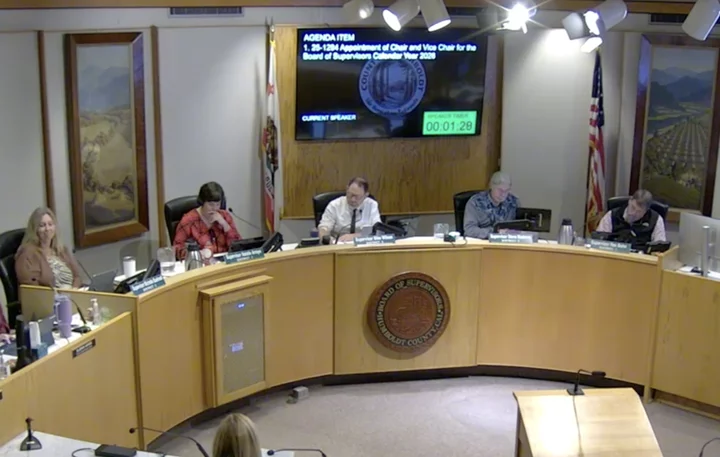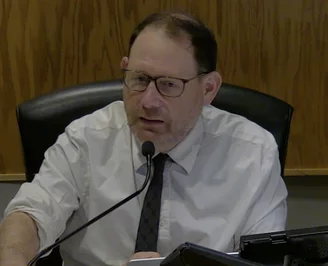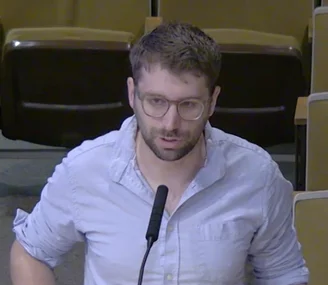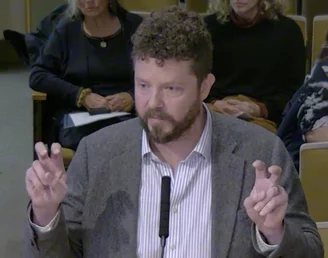Screenshot of Tuesday’s Humboldt County Board of Supervisors meeting.
###
The Humboldt County Board of Supervisors made quick work of its agenda this morning, wrapping up the public portion of the meeting before heading into closed session just before noon. Let’s get into it!
Board Appointments for 2026
At today’s meeting, the board made its selections for board chair and vice chair for the coming year. After passing on the opportunity a few years back, Third District Supervisor Mike Wilson agreed to step up from his current role as acting chair to chair of the board in 2026, with Fourth District Supervisor Natalie Arroyo to serve as vice-chair.
“I didn’t do chair [before] because we were in the midst of COVID, kids at home — all kinds of stuff,” Wilson explained. “We had a volunteer, [former Fourth District Supervisor] Virginia Bass, who did a wonderful job and enjoyed it so she took it on. I’m completely ready to take on the chairmanship, if that’s the desire of the board.”
Wilson assumed the chair’s responsibilities earlier this month after the board voted to censure Second District Supervisor Michelle Bushnell and remove her as chair in response to sustained allegations that she mistreated two county employees. At today’s meeting, Bushnell made the motion to appoint Wilson and Arroyo to the chair and vice chair positions.
The motion passed in a unanimous 5-0 vote.
Continuing with appointments for 2026, the board selected First District Supervisor Rex Bohn to serve as a delegate for the Rural County Representatives of California (RCRC), a position he has held for more than a decade. Wilson was appointed to serve as an alternate.
The board also voted to appoint Arroyo to the California State Association of Counties delegation, with Wilson as an alternate. The board approved the appointment in a 4-1 vote, with Bohn dissenting, though he didn’t say why.
New Rules for Cannabis Microbusinesses
A little earlier in the meeting, the board approved a couple of changes to the county’s Commercial Cannabis Land Use Ordinance to ease the licensing process for small-scale cultivators and promote vertical integration. The amendment will allow cannabis microbusinesses (license holders with less than 10,000 square feet of cultivation area) to incorporate processing, sales and “non-volatile manufacturing” into their cultivation permit.
“This exception essentially states, if you’re not expanding anything — no new buildings, all your cannabis that you’re working with is grown on site and you don’t have any customers on site — then you can go through this process as well for the microbusiness,” said Augustus Grochau, a staff planner for the county. “To make it easier to get manufacturing, we’ve also added another ZCC [zoning clearance certificate] option, provided that it is in association with a cultivation permit without customers on site.”
Bohn asked if the change would allow small-scale growers to skip the distributor and sell directly to retailers, adding that “most of my complaints lately have been from distributors not paying the cultivator.”
“To be able to sell your product, you’re going to need to modify your permit in order to allow for off-site retail sales,” Grochau said, adding that a state transport license would still be required to self-transport.
Speaking on behalf of the Humboldt County Growers Alliance during public comment, Ross Gordon thanked staff for relaxing some of the rules for small-scale cultivators.
“This is definitely one of the top issues — if not the major issue — that farmers here are facing broadly, which is trying to sell a craft product, but having to go through multiple middlemen on the way to doing that distribution and retail,” Gordon said. “That means you’re not necessarily controlling the quality of your product as it moves through the supply channel … and it means, as I think was pointed out, you may not get paid, and a lot of people are in that situation.”
Marissa Hartley, a senior program manager for environmental consulting firm Antea Group, expressed concern about new sanitation guidelines from the Department of Cannabis Control that would prohibit animals and pets from being allowed in a cannabis processing facility. She worried that the new rules would impact microbusinesses operating out of their homes.
Following public comment, Planning and Building Director John Ford politely noted that pets can easily be kept out of cannabis processing areas.
“I don’t want to sound flippant, but if that’s going to be a requirement of the state, and you’re processing in your garage, keep the pet out of the garage,” he said. “I don’t know what else to say.”
After a bit of additional discussion, Fifth District Supervisor Steve Madrone made a motion to approve the amendments, along with an addendum to the environmental impact report for the county’s cannabis ordinance. The motion passed 5-0.
Homeless Supportive Housing Cuts
During the reading of a proclamation for Hunger and Homelessness Awareness Week, several community leaders raised concerns about federal funding cuts that threaten permanent supportive housing for the homeless. The item spurred a half-hour discussion, despite the fact that it appeared on the board’s consent calendar and was not pulled for discussion.
Nezzie Wade, executive director of Affordable Homeless Housing Alternatives (AHHA), said local providers are expecting a 50 percent reduction in funding for permanent supportive housing, which receives funding through the U.S. Department of Housing and Urban Development’s (HUD) Continuum of Care Program.
“The prospects for our future, with respect to budget cuts and things that we’re facing now … make it look pretty bleak in our future,” Wade said. “We really need the state to step up, and we need to work better and put more input and pressure on housing and community development so we can open up different kinds of housing types that we need.”
Wade asked the Board of Supervisors to form a task force that includes people experiencing homelessness to better inform the county’s approach to the shelter crisis.
Food for People Executive Director Carly Robbins brought up the recent lapse in SNAP benefits and expressed concern that people living paycheck to paycheck would soon be forced to “make the choice between putting food on the table or paying their rent,” putting them at risk of homelessness.
“Frankly, this has been a challenging year for anyone doing food security work,” she said. “From the cuts we’ve seen to just the last few weeks of folks losing benefits, it’s pretty dramatic, and I really only see it going further in that direction. Pretty soon, federal changes to policy will have significant impacts on how supplemental nutrition assistance programs are administered and who’s eligible. … And ultimately, it’s going to kick people off of the program.”
Asked to clarify some of the points made about the federal funding cuts, Robert Ward, housing and assistance coordinator for the Humboldt County Department of Health and Human Services (DHHS), said HUD plans to put a 30 percent cap on permanent supportive housing for the homeless and shift its focus to temporary shelters.
“HUD wants to move back in the direction of transitional housing in kind of an extreme way,” he said. “[W]e could potentially transition 60 percent or so of our permanent supportive housing to transitional housing. We’ll get one year to transition, [which] takes us to October 1, 2027, when they would have to fully be transitional housing projects. The big difference between transitional housing and permanent housing is the 24-month limit on how long people can remain in the transitional housing.”
Following public comment, Madrone noted that the board had formed an ad hoc committee to address some of the issues surrounding homelessness.
“I’m hoping that our ad hoc will absolutely reach out to these folks and seek their wisdom and advice [on] how we might continue to partner on this compassionate assistance approach to solving some of our problems,” he said. “When we work together, we’re going to do a lot more.”
Arroyo said she was “deeply worried” that losing federal funding could put more people out on the street. Speaking to a previous comment questioning the efficacy of the county’s homeless outreach efforts, Arroyo noted, “Just because we currently see people on the street doesn’t mean that our programs aren’t serving other people who aren’t on the street.”
“Whatever we can do as a board … to advocate, I’ll say I’m willing to do, and I believe this board would be willing to do so,” she added.
The board eventually approved the proclamation along with the rest of the consent calendar, but did not take any additional action on the subject.




CLICK TO MANAGE